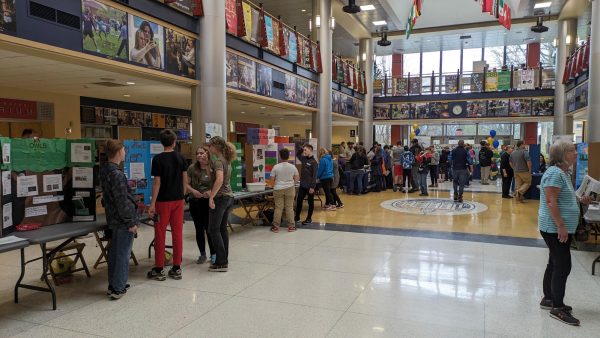Gnibus, Ferrence speak at local candidate forum
About two dozen people gathered virtually on Monday, Oct. 19, in two local candidate forums hosted by the Center for Political Participation.
Kristy Gnibus, a middle-school teacher from Erie who is challenging Representative Mike Kelly for Pennsylvania’s 16th congressional district in the U.S. House of Representatives, spoke at the 6 p.m. forum.
Each forum was divided into three parts. First, the candidates had five minutes to introduce themselves and give an opening statement. They were then given 30- minutes to talk about three different topics, divided into three 10-minute periods, before the digital floor was opened to a town-hall-style question-and-answer session. For Gnibus, this election is personal.
“When I’m fighting for PA-16, I’m fighting for my family (too),” Gnibus said. “I’ve been working two to three jobs ever since I graduated college just to make ends meet. I have school debt. I understand a lot of the plights that Western Pennsylvania is going through.”
The first of Gnibus’ three topics was jobs and the economy.
“(Jobs are) the bread and butter,” Gnibus said. “It’s what people think about the most. Even though healthcare and all these things are important, here in Western Pennsylvania we think about how we’re going to put food on the table. How we’re going to be able to pay for our rent or mortgage. How we’re going to be able to pay for our car payments.”
Gnibus argued that the path to fresh job and economic growth was through sustainable development, particularly sustainable infrastructure. In her second session, focused on the environment, Gnibus noted that Erie County has potential when it comes to renewable energy.
“Being the most wind-rich county in all of Pennsylvania and not utilizing that at all is horrendous,” Gnibus said. “We have a real opportunity; there’s so much wind here in Erie County that they believe it could even power a quarter of the state. Think of the revenue there. Think of the investment that folks should want to make in that industry here in Western Pennsylvania.”
On public health, her third and final topic, Gnibus went after Republicans — including her opponent, Mike Kelly — for failing to enact restrictions related to the virus. She also attacked Republicans for trying to repeal the Affordable Care Act without having a plan to replace it.
“I am someone that is considered (to have) pre-existing conditions, even though I have been cancer-free for almost 14 years,” Gnibus said. “That’s terrifying. We have to protect our current healthcare system, and hopefully we can make it better … Without actually seeing a plan to replace (it), we have to protect it.”
During the town hall session, Gnibus fielded a number of questions on topics from promoting diversity and raising the minimum wage to QAnon and court packing. On the question of college affordability, however, she again spoke from personal experience.
“It looks like at the rate I’m going, I will finally pay off all of my school loans when I retire,” Gnibus said. “I feel this burden, and I think about it all the time: if my children decide to go to college, and what that looks like.”
At the beginning of the forum, Professor Brian Harward, director of the Center for Political Participation and Robert G. Seddig Chair in Political Science, noted that a forum with Representative Mike Kelly, the incumbent in the race, was still in the works.
“Representative Kelly has also agreed to participate in a forum and we’re hopeful his schedule will permit that soon, though we have not identified a date,” said Harward.
The second forum of the night, at 7 p.m., belonged to Matthew Ferrence, English Department Chair and Associate Professor at Allegheny College. Ferrence is running for the 6th District seat in the Pennsylvania House of Representatives against incumbent Brad Roae. Roae declined to participate in the forum. For Ferrence, the race traces deeper narratives than just that of the current election.
“We live the stories we tell and the stories that are told about us,” Ferrence said. “There are persistent stories that are told about Appalachia and also the Rust Belt, which comes across Ohio. We’re at the confluence of Appalachia and the Rust Belt. Part of why I’m running and how I’m running is a recognition that our politics reflects too often the stories that are told about us that eliminate a lot of the realities of the experience on the ground and actually cut a lot of people out of the picture of how we might imagine doing better in a region like this.”
One of the key issues of Ferrence’s campaign is that of economic justice and equity. Like Gnibus, his first topic was jobs and the economy.
“Ranking 56th out of 67 (counties in per-capita income) is not good, obviously, and it’s been consistent for a long time, ” Ferrence said. “The point I would make to that is that’s not by accident. If you look at the history of Appalachia or the history of the Rust Belt post-industrial areas, what you see is that the people have been used as commodities to be exploited.”
Ferrence’s second topic was that of education, which he used to criticize his opponent, Brad Roae.
“You have been shortchanged another hour tonight that Brad Roae is not here tonight, because he decided that … instead of coming to participate in a forum sponsored by the college that is a cultural, economic, community foundation, he would instead criticize the CPP for being biased simply because I work here,” Ferrence said. “The reality of him as a representative has been phenomenally toxic to education at all levels.”
Emma Godel, ’21, is a CPP fellow and moderated Kristy Gnibus’ forum alongside Allison Peasly, ’23. She said that all four candidates received the same email inviting them to the event and noted that the CPP is a neutral organization that does not favor any one candidate.
“It’s important to note that Dr. Ferrence’s position here at the college preexisted that of his candidacy,” Godel said. “Those are two separate entities and if (Ferrence is) elected I assume he will assume two separate roles — that is, one at the State House and one here at the college.”
Ferrence’s final topic before the floor was opened for the town hall was healthcare. He pointed to local medical centers as evidence that there was a need for what he called, “a radical change in the way we provide healthcare for everyone.”
“Seventy percent of the billing at Meadville Medical Center comes from individuals who need services who are either on Medicaid or medical assistance in some way,” Ferrence said. “(This) means that 70%, ultimately, of the patients at the medical center cannot afford private insurance on the open market.”
At the state level, Ferrence believes in a single-payer system sponsored by the state. He pointed to a current bill at the State House, which would tax the employer 10% and the employee 3%, as an example, and did the math on his own insurance costs.
“In (my) particular case, if we went to 3%, my family medical costs would drop to $2,500,” Ferrence said. “My family would save almost $5,000 off the top by having a new tax of $2,500. My employer would save more than ($7,000).”
Like Gnibus, Ferrence fielded questions on a wide variety of topics from gerrymandering to reopening the local economy. In response to a question from Professor Harward, Ferrence noted that the demographics of the 6th district would be an advantage when making deals with Republican legislators.
“Representing a rural, Republican area would give a unique position in the house to be a dealmaker and a bipartisan strength,” Ferrence said. “The issues that the constituents I would have would face in Crawford and Erie County would be very similar to other constituents who are Republicans … Suddenly you have the ability to talk about issues with legislators in different ways. The longer, harder answer to that is, we’ve got to find a way to change the tenor of what’s happening in Harrisburg … to try and break down that intractability.”
This was not the CPP’s first virtual or socially-distanced event. Two weeks ago, the center hosted Anne Geran, ’85, White House correspondent for the Washington Post, and Quigley Hall has played host to socially-distanced debate watch parties and town halls on local and global issues.
“We haven’t been doing nearly as many events as we have in the past, and I don’t think that’s necessarily a bad thing,” Godel said. “All of us are focused on our health and navigating a completely new environment … We regularly get tested for COVID-19, and we want to make sure those tests remain negative.
Professor Matthew Ferrence and Representative Brad Roae will both participate in a live question-and-answer forum at 7 p.m. on Oct. 27, hosted by the Meadville Tribune. The event will be broadcast on Armstrong cable channels 23 and 100, WMVL-FM, and Cool 101.7 FM.

Sami Mirza is a senior from many different places. He is majoring in International Studies with a focus on the Middle East and North Africa and minor in...






